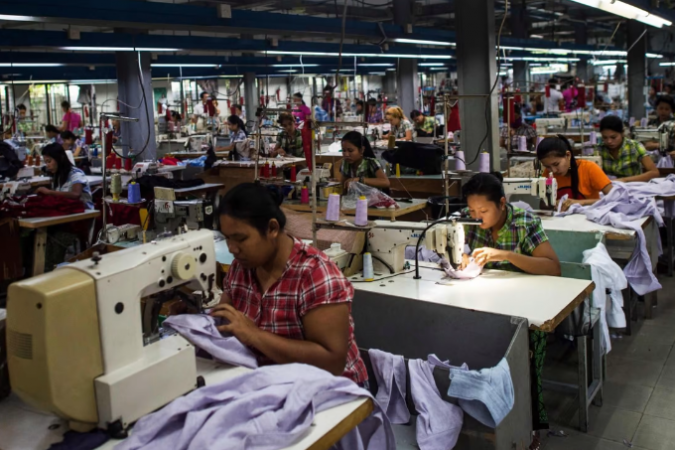
Myanmar: International fashion brands are failing to protect apparel workers in Myanmar's supply chains as labor and human rights violations escalated across the country since a military coup in February last year, according to a new report.
A study published Tuesday by the Business and Human Rights Resource Center, a global NGO that monitors how businesses affect human rights, found "widespread and systematic abuse in the supply chains of international brands." This includes rates of sexual harassment and gender-based violence, abusive working conditions, required unpaid overtime and abusive work, in addition to wage theft.
Based on publicly available data, the non-profit organization and partners compiled 104 cases of labor and human rights violations against at least 60,800 workers in Myanmar's apparel sector from February 1 last year to the present.
According to the report, workers from 70 factories including Adidas, Inditex (Zara and Bershka), Fast Retailing (Uniqlo), multinational fashion retailer Henness & Mauritz (H&M) and Primark are involved. At least 32 other global fashion brands and retailers are also said to have received products from these factories in the past.
Alisha Khambe, director of labor rights at the Business and Human Rights Resource Center, said brands should "wake up to the harsh reality that good working conditions no longer exist in Myanmar and continue to do business as usual to 'protect jobs'." I am not getting help and workers', as has been repeatedly claimed."
When the army is not conducting door-to-door searches of people's homes and hostels, he said, "the factories request their presence to silence the workers."
violence against women
Nearly 700,000 garment workers in Myanmar, 90% of whom are women, have been at the forefront of the country's civil disobedience movement against the military.
According to the researchers, they have experienced an increase in gender-based harassment and violence under the regime.
The report cited 28 specific instances of alleged gender-based abuse against female employees, including sexual harassment and physical and verbal abuse. However, most other incidents meet the criteria for gender-based violence defined by the United Nations.
According to the researchers, while companies such as Primark and H&M initially stopped taking orders after the military takeover, they have resumed, citing job protection as a key factor in their decision.
According to the researchers, while companies such as Primark and H&M initially stopped taking orders after the military takeover, they have resumed, citing job protection as a key factor in their decision.
Still, the report said, "Early in the COVID-19 pandemic, some of these brands—and many others sourcing from Myanmar—cancelled orders and retroactively discounted them with little consideration for workers in their supply chains." who were fired. without payment of wages due in thousands."
Garment workers could expect to make about $3.50 USD per day before the military takeover, but under the current administration, workers claim that many factories have taken wage cuts, pressuring them to meet higher production targets. Many people now make less than $2 a day.
Although some organizations and companies, including Inditex and Mango, claimed to have severed ties with the offending factories, advocates claimed that such efforts fell short.
US asks China to condemn Myanmar after execution of activists